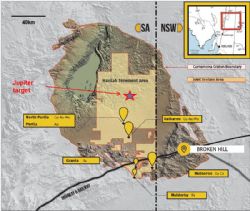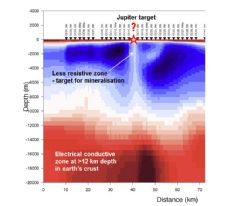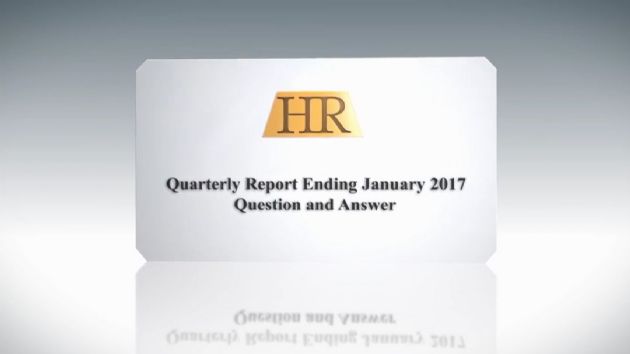 Potential IOCG Target Identified by New Geophysical Results
Potential IOCG Target Identified by New Geophysical Results
Adelaide, Oct 27, 2017 AEST (ABN Newswire) - Havilah Resources Limited ( ASX:HAV) (Havilah) advises that recent University of Adelaide research has identified a significant new magnetotelluric (MT) geophysical feature within Havilah's tenements about 30 km north of Portia.
ASX:HAV) (Havilah) advises that recent University of Adelaide research has identified a significant new magnetotelluric (MT) geophysical feature within Havilah's tenements about 30 km north of Portia.
Highlights
Recent magnetotelluric geophysical results have identified signatures associated with IOCG mineralisation within Havilah's tenements.
Details
MT relies on measuring the very small natural time variations of the Earth's magnetic and electric fields to determine the electrical resistivity in the subsurface. The method is able to distinguish zones of varying electrical conductivity in the earth's crust to depths of more than 20 km.
Past research work in the Gawler Craton identified a large conductive zone at depth beneath the Olympic Dam copper deposit with a distinctive low resistivity feature rising up towards the surface immediately beneath the orebody (see picture below). This vertical feature has been interpreted as a possible feeder zone for metalliferous fluids from a more conductive and potentially copper rich part of the deep crust in this region.
With this concept in mind, the Geological Survey of South Australia and the University of Adelaide carried out a wide-spaced MT survey over South Australia as part of the national AusLAMP (Australian Lithospheric Achitecture Magnetotelluric Project) program. This identified a similar large MT conductive anomaly in the northern part of Havilah's tenements, which Havilah has called the Jupiter target (see map). Notably, the volcanic rocks and associated granites in this part of the Curnamona Craton are almost identical in age and origin to those in the Gawler Craton that host the Olympic Dam deposit, a point which encouraged previous explorers like MMG and Newcrest in their quest for IOCG (iron oxide copper gold) deposits in this region.
Professor Graham Heinson and his team from the University of Adelaide sought to obtain more detailed information about the Jupiter MT anomaly and carried out an east-west traverse across it, taking readings every 2 km (versus the original 50 km spacing of the AusLAMP survey readings). The South Australian Government supported the research work with PACE Copper funds and Havilah provided logistical support from its Portia mine site.
Results of this research, recently reported in an Honours thesis, have not only confirmed the Jupiter MT anomaly but have identified a prominent vertical low-resistivity feature rising to the surface, comparable with that seen beneath the Olympic Dam orebody. Notably, this feature corresponds closely with a regional aeromagnetic anomaly.
Commenting on this research work, Havilah Managing Director, Dr Chris Giles said: "The Jupiter MT anomaly is an amazing geophysical feature and warrants a further exploration work to see if indeed it is pointing us towards a major mineralised system, as on the Gawler Craton.
"Given the potential exploration significance, at recent Board meeting Directors decided, subject to sufficient funds being raised in the current rights issue, to allocate a budget for further exploration of the Jupiter MT anomaly with the objective of defining a drilling target " he said.
To view figures, please visit:
http://abnnewswire.net/lnk/R1TJ4548
About Havilah Resources Ltd
 Havilah Resources Ltd (ASX:HAV) is a debt free South Australian gold producer having recently financed and developed its first gold mine at Portia in north-eastern South Australia. It plans to follow on with three copper-gold-cobalt mining developments at North Portia, Kalkaroo and Mutooroo, which are underpinned by a JORC resources mineral inventory of over 1.4 million tonnes of copper, 3.6 million ounces of gold, and 18,000 tonnes of cobalt.
Havilah Resources Ltd (ASX:HAV) is a debt free South Australian gold producer having recently financed and developed its first gold mine at Portia in north-eastern South Australia. It plans to follow on with three copper-gold-cobalt mining developments at North Portia, Kalkaroo and Mutooroo, which are underpinned by a JORC resources mineral inventory of over 1.4 million tonnes of copper, 3.6 million ounces of gold, and 18,000 tonnes of cobalt.




![abnnewswire.com]()
Related Companies
Social Media
Share this Article

 ASX:HAV) (Havilah) advises that recent University of Adelaide research has identified a significant new magnetotelluric (MT) geophysical feature within Havilah's tenements about 30 km north of Portia.
ASX:HAV) (Havilah) advises that recent University of Adelaide research has identified a significant new magnetotelluric (MT) geophysical feature within Havilah's tenements about 30 km north of Portia.  Havilah Resources Ltd (ASX:HAV) is a debt free South Australian gold producer having recently financed and developed its first gold mine at Portia in north-eastern South Australia. It plans to follow on with three copper-gold-cobalt mining developments at North Portia, Kalkaroo and Mutooroo, which are underpinned by a JORC resources mineral inventory of over 1.4 million tonnes of copper, 3.6 million ounces of gold, and 18,000 tonnes of cobalt.
Havilah Resources Ltd (ASX:HAV) is a debt free South Australian gold producer having recently financed and developed its first gold mine at Portia in north-eastern South Australia. It plans to follow on with three copper-gold-cobalt mining developments at North Portia, Kalkaroo and Mutooroo, which are underpinned by a JORC resources mineral inventory of over 1.4 million tonnes of copper, 3.6 million ounces of gold, and 18,000 tonnes of cobalt.













